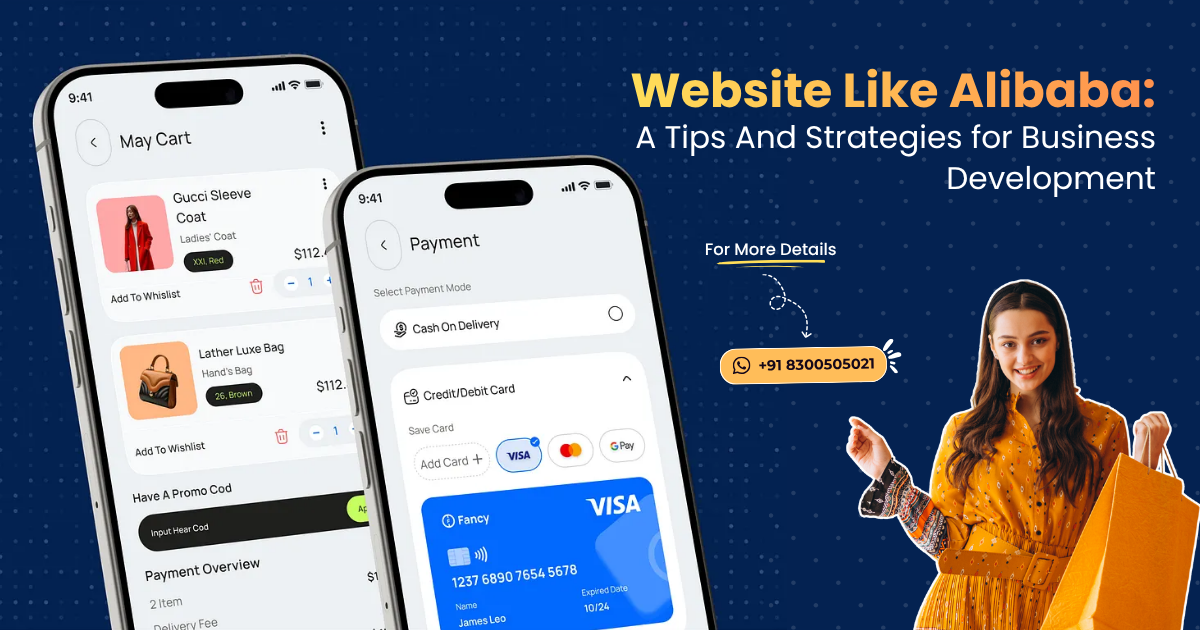In the modernized market that is highly global, technologies such as Alibaba have transformed how companies interact, trade, and grow across international borders. Alibaba is reputable because of its huge e-commerce system that facilitates the connection between buyers and sellers at the international level. The given platform is not the only one to provide such services, however. Some other sites, such as Alibaba, are also offering businesses a chance to grow, shop for products, and increase their reach into the international markets. The blog will explore the strategies to bring a website like Alibaba.
What is Alibaba Clone?
An Alibaba clone is ready-to-use e-commerce software that enables companies to easily create a B2B (business-to-business) marketplace like Alibaba, linking manufacturers, wholesalers, and retailers. The scripts have the necessary functionalities, such as listing of products, vendor management, payment gateways, and secure communication that normally can be customized to meet a particular niche or brand.
Knowing the Emergence of B2B E-Commerce Platforms
The emergence of B2B e-commerce platforms can be attributed to the demand by buyers to have convenience, the generational change of B2B buyers, whereby they are used to transactions via digital platforms, and the operational advantages of automation, efficiency, and scalability. These services allow 24/7 access, custom experiences, simplified orders, and useful data analytics, and they make B2B sales a faster and more streamlined process. The use of such key technologies as mobile commerce, AI, and SaaS integrations is also driving this change, and nowadays, digital-first strategies are a necessity for any new business.
How to create a website like Alibaba?
Phase 1: Planning and Strategy
Establish Your Niche and Business Model. Alibaba is an enormous horizontal B2B marketplace. It is recommended to begin with a certain niche (e.g., industrial equipment, textiles) in order to decrease competition.
Decide on your revenue model:
Commission-based: Making a percentage commission on every sale (mostly).
Subscriptions: It means charging sellers a monthly/annual fee (as Alibaba did with its “Gold Supplier” status).
Advertisements: It is letting sellers pay to be listed as a premium/featured seller.
Carry out Market Research: Compete with others, find out who your target audience (buyers and sellers) is, what their pain points are, and what your distinct value perception is.
Develop a Business Plan: Map out your objectives and business operation strategy (logistics, supplier checks, and financial estimates).
Register Your Business: Legal business registration, licensing, and permits, as well as opening a business bank account.
Phase 2: Platform and Technology
This is the stage of platform and technology selection.
Choose a Development Method:
SaaS/Plugins: Use software solutions such as Shopify with multi-vendor i.e. Dokan or specifically Yo!Kart/CS-Cart to launch more quickly and at a lower cost.
Migrateshop can provide an appropriate Alibaba clone program that can qualify as this type.
Custom Development: Contract a group of developers to create the platform on the basis of such technologies as Node.js, Python, Laravel, React, and powerful databases (MySQL, PostgreSQL).
This is costlier but has the full customization and scalability of a colossal global platform.
Select a Tech Stack: Determine technologies that are based on a multi-vendor architecture, secure transactions, and scalability.
Phase 3: Webpage Development and Maintenance
Introduce basic functions needed in a B2B marketplace:
User Management: Buyer, Seller, and Administrator role-based dashboards.
Product Catalog: The system has a powerful platform with precise product specifications, bulk uploading, and minimum order quantity (MOQ) facilities.
Advanced Search & Filters: An Intelligent search option where the filters include price, location, category, and so on to assist the user in locating products with ease.
Communication System: Inbuilt chat or Request for Quotation (RFQ) feature offering direct bargaining between purchasers and dealers.
Safe Checkout/Payments: A variety of payment gateways (Stripe, PayPal, bank transfer) with an optional escrow feature to build trust by holding the money till the delivery is made.
Order and Logistics Management: An order handling system, a shipment, and a return management system.
Ratings & Reviews: Buyers review the sellers by having a transparent system that guarantees a quality product and credibility.
Mobile Responsiveness: Make sure that the site works perfectly across all devices.
Phase 4: Testing, Launch, and Growth
Testing and Quality Assurance: Testing and quality assurance are to be carried out properly by performing extensive functional and performance tests to provide a bugless, smooth user experience at the time of launch.
Beta Launch: TA can also be recommended to launch a beta, which will provide feedback on the usability of the real users and make the requisite modifications.
Marketing: Adhere to SEO best practices, conduct intensive advertisement campaigns (PPC, social media), and create a community to gain the first users.
Continuous Improvement: With analytics, monitor KPIs (Key Performance Indicators) and user behavior, collecting feedback loops to ensure constant updates and improvements are made to it.
Must-Have Features to build a website like Alibaba
This will require a multi-vendor marketplace solution, such as a user and seller dashboard, a product and inventory management solution, a secure payment gateway, and a shipping and logistics solution to establish a site like Alibaba. Let’s have a look at the essential features to build a website like Alibaba,
Features necessary for Sellers and Buyers
User and Seller Dashboards: Offer sellers and buyers individual dashboards to organize their storefront, product, and inventory, and monitor their orders and their accounts, respectively.
Product and Inventory Management: Establish a product listing system with the capability for sellers to maintain information on current stock and the buyers to easily locate and compare goods.
Bulk and Wholesale Ordering: Add such features as Minimum order quantity (MOQ) and bulk ordering applications to meet the business-to-business (B2B) transactions.
Search and Navigation: Provide a strong and intuitive search with advanced filtering to enable users to search efficiently.
Product Reviews and Ratings: It enables customers to leave their reviews and ratings of the products and sellers to gain credibility.
Communication Tools: Incorporate a system that enables buyers and sellers to communicate directly, commonly by built-in messaging ora Request for Quotation (RFQ) module.
For Admin
Multi-Vendor Architecture: The platform must be able to accommodate various sellers who are present on the same trading platform.
Payment Gateway Integration: Incorporate safe and sound payment gateways to handle the transactions with or without an escrow system added to achieve more security.
Shipping and Logistics Integration: Partner with shipping companies to offer end-to-end logistics tracking and control.
Admin Dashboard: Design an elaborate administration dashboard where you would administer users, orders, vendors, and other actions of the site.
Statistics and Reporting: This offers administrators and sellers tools to create reports on sales, profits, and business performance.
Conclusion
The internet has transformed business to an unprecedented level, with websites such as Alibaba facilitating businesses to reach new markets around the world and access suppliers and customers. Nevertheless, searching other websites such as Global Sources, DHgate, Made-in-China, and TradeIndia will increase your sourcing possibilities, lower prices, and enable you to remain competitive in the fast-evolving global market.
These platforms can be used not only to locate products with the right strategies, which include good communication, sourcing diversification, and building a brand, but also to grow and scale your business to an extent that was previously unthinkable.
Therefore, start now and investigate these B2B script giants and bring your business to a new level!







